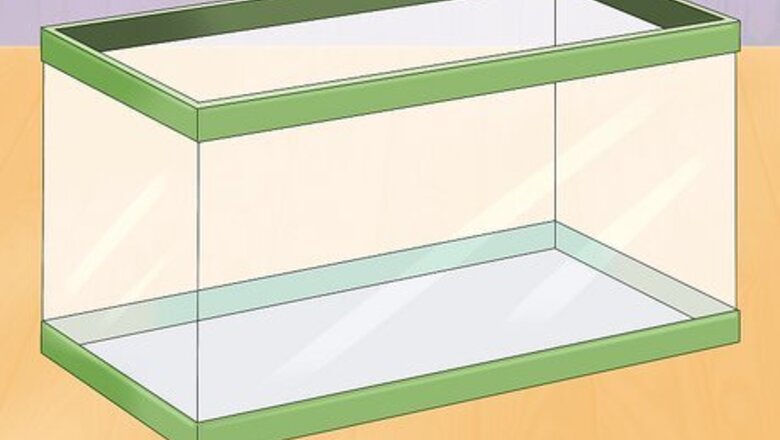
views
- Gerbils need a clean and tidy cage to settle down in.
- Give these little rodents a few days to adjust to your home.
- Introduce your pet to people and other gerbils to socialize it.
- Create a taming plan that’s adapted to your gerbil’s unique personality.
Prepare your gerbil’s home.

First things first, set up a cute little sanctuary for your new pet. Purchase a cage that will fit your gerbil or gerbils. Having their special “home” prepared and inviting will help you tame them more effectively because they’ll be more likely to warm up to their new environment. Glass aquariums, terrariums, wire cages, and plastic cages are all great options for your gerbil’s cage. Purchase accessories for the cage that will allow your gerbils to chew, hide, and indulge their curiosity. Gerbils are clean animals, you’ll need to keep a tidy and hygienic cage to make sure your pet stays happy and healthy.
Make your gerbil’s cage as comfy as possible.
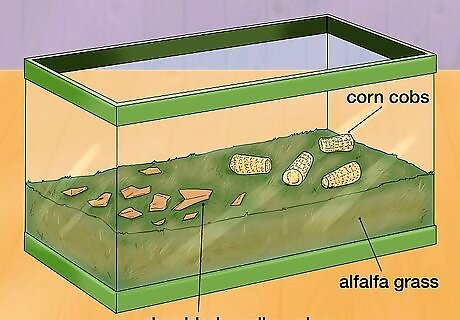
Give your gerbil’s home lots of padding so it can relax. Line the bottom of your gerbil’s cage with soft materials that they can enjoy as bedding, such as corn cobs, hay, or shredded cardboard. Use alfalfa grass as a filler with any of these bedding options as the perfect upgrade for your furry critter’s home. Set up bedding that’s at least 8-12 inches (20-30 cm) deep so it’s a perfect resting spot for a gerbil of any size, including an adult one. A fully grown gerbil is typically 4.72 inches (12 cm) tall. Change out the bedding on a monthly or biweekly basis!
Buy the right snacks for your gerbil.
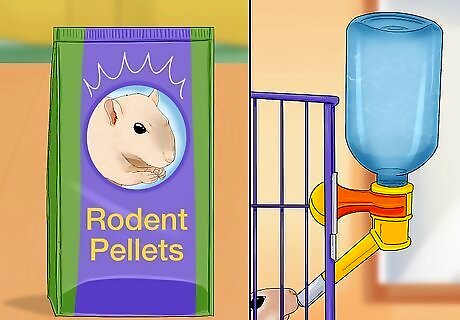
Get the best and most nutritious food for your gerbil. Gerbils eat a mix of rodent pellets, seeds, fruits and vegetables, and insects. Keep a variety of these healthy snacks in the cage. Make sure you also put a water bottle in the cage so that your gerbil doesn’t get dehydrated. Since gerbils originally lived in deserts before they were domesticated, you might not see them guzzle their water!
Get a buddy for your gerbil.
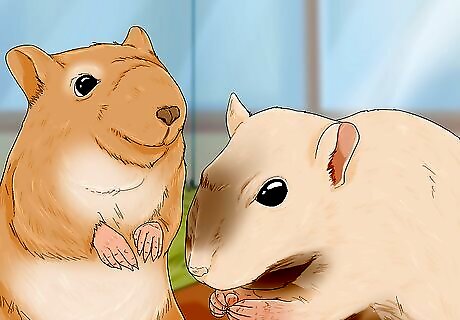
Adopt 2 gerbils so they can bond and rely on each other. To make your gerbil happy, purchase a pair of gerbils so they can be buddies. If you buy one gerbil it will be more work to tame it, especially since there will be less entertainment, so consider getting two! The younger your gerbils are, the more success you'll probably have taming your gerbils. Get gerbils that are more than 5 weeks old to help make sure that they’ve had enough time with their mother so they aren't stressed or nervous. If possible, buy your gerbils from a reputable breeder. You're more likely to find gerbils that don't have any deformities from inbreeding. Check to make sure your gerbils are healthy. Their coats should be full and glossy, their eyes bright and shiny, their noses clean, and their teeth straight. If you notice any problems, ask the breeder about the gerbil or decide on another gerbil that looks like it's in better shape.
Learn the temperament of your gerbils.

Take note of your gerbils' unique attitudes. Before you tame a gerbil, learn more about their personality and how they behave. For example, while gerbils are usually very loving animals, they can also be shy and aggressive if they’re scared. When you interact with your gerbil, check if they're really affectionate or if they take time to warm up. These first steps to getting to know your gerbil can help you successfully tame them. Gerbils are naturally shy but can bond well with their human family over time. Plus, they don’t like to be left alone or isolated, so they'll eventually really like your company. Gerbils are also very active. If you have 2 gerbils, they’ll likely play with each other all day. Since gerbils can be very territorial, be careful introducing a new gerbil to an already existing gerbil community and see how they all interact with each other. Gerbils rarely bite and typically only show this kind of aggression if they’re scared.
Put your gerbil’s cage in a calming place.
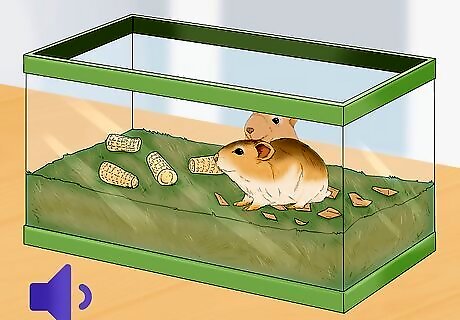
Choose a nice spot where your sweet critter won’t get startled. Place its cage in an area of the house with medium traffic so that you don’t startle your gerbil with too much activity. Since gerbils are curious, they’ll actually like to watch what’s going on around your house and be part of the action. Plus, it’s important that they adjust to the normal amount of noise in your home.
Allow the gerbils to settle into your home.
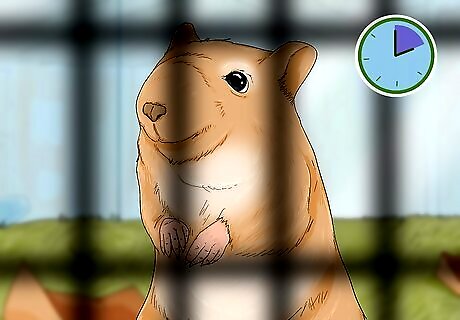
Give your gerbils plenty of time to adapt to their environment. Moving a gerbil into a new space from another home is traumatic for these sweet creatures of habit. Although your instinct may be to take them out and play, allow them some time to recuperate and settle into their new surroundings. This may help you tame them more effectively as well. Wait at least 3 days for your gerbil to adapt to their new home before you handle them. Otherwise, they'll probably be too stressed to tame.
Wash your hands before you handle your gerbils

Gerbils are very sensitive to smells. Make sure to thoroughly wash your hands with unscented soap before you handle them. This simple step can help calm your gerbil and make them more likely to jump into your hands to play.
Reach into a cage to gain your gerbils' trust.
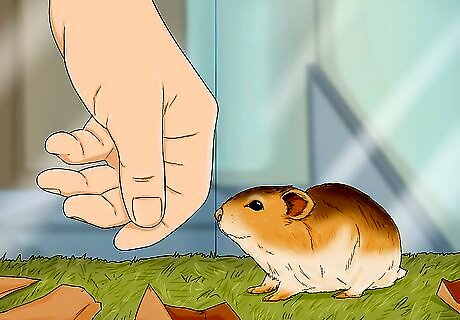
Give your gerbils a chance to warm up to you. Reach into the cage on a regular basis to clean it or to let your gerbil sniff you. Even if they don't jump into your hands right away, your gerbil is a lot more likely to play with you frequently if they're already used to your presence. Make sure your gerbil knows you’re around before you put your hand in the cage so that you don’t startle your animal. If you put a few seeds in your hand when you place it in the cage, your gerbil may approach you more quickly. Remember to remain calm as gerbils can smell adrenaline in your sweat.
Hold your gerbil to bond with it.
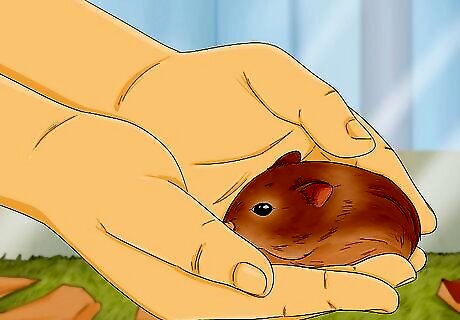
Handle your pet with care and it’ll start to adore you. Once you’ve gained your gerbil’s trust, you can start to hold them more often. If you stay calm and handle your gerbil properly, you can likely hold them for hours or let them climb on your arms or shoulders to explore for fun. Scoop up your gerbil with both hands to carry them in a non-threatening way. You can even put some seeds in your hands to help your gerbil settle down. When you pick up your gerbil, it may help to turn away from their tank or cage. This way, they won’t keep thinking about the safe environment that they’re used to hanging out in—instead, they’ll focus more on you! Some gerbils don’t like to be held. If that’s the case, just feed these gerbils and give them toys to let them know you’re there to take care of them.
Make a taming plan.
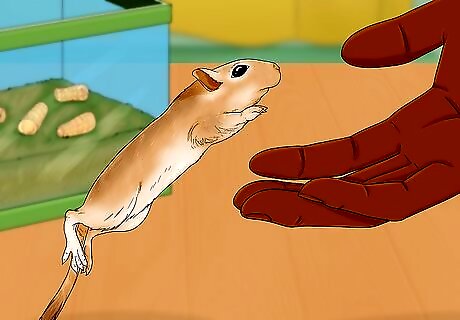
Design special training sessions to get your gerbil out of its shell. For example, to encourage bravery and social skills, hold out a treat so your gerbil can eat it through the cage’s bars—this simple form of “hand taming” can help them grow more comfortable around people. Making a plan will give you a chance to consider your gerbil’s personality and other factors, like whether your gerbil is older or a baby. When developing your training plan, think about your gerbil’s unique attitude. For example, some gerbils will naturally jump onto your arm, while others may take time to get used to you. Since training is something you need to do regularly and over time, set short-term and long-term goals. You can develop your plan by setting daily, weekly, and monthly intentions or goals for your gerbil.
Start your gerbil taming as soon as possible.
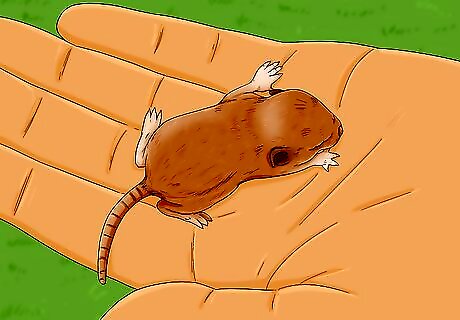
Build good habits ASAP by training your gerbils when they’re young. From babies to older animals, gerbils respond well to taming with the proper guidance from early on in your relationship. Follow the taming plan you designed to help you stay on track with the process. Gerbils of any age respond well to taming. If your gerbil is older, don’t be discouraged if they take longer to tame. Just work with them as soon as they join your family. It may take a little more patience, but eventually, your gerbil will adapt to your training. To stay motivated, remember that gerbils are intelligent and loyal companions. Proper communication and encouraging the right behaviors will help you train your gerbil at any age.
Socialize your gerbil.

Encourage your gerbil to enjoy the company of others. To properly train your gerbil so they're less likely to be anxious or aggressive, expose them to other gerbils as well as people. Keep them happy and comfortable in any situation by regularly arranging “playdates” with gerbils and letting your friends look at them. In time, they might soak up all the attention and really like it. It’s important to socialize your gerbil ASAP so they don’t become nervous by having people around them or act out with aggression when they see strangers. Help your gerbil be comfortable around people by exposing them to positive and calm situations with warm and friendly people. Tell any new people to allow your gerbil to sniff them first so the animal is less likely to feel threatened. Take your gerbil out of its cage and let them explore so they can get to know everyone in your house.
React to negative behaviors ASAP.
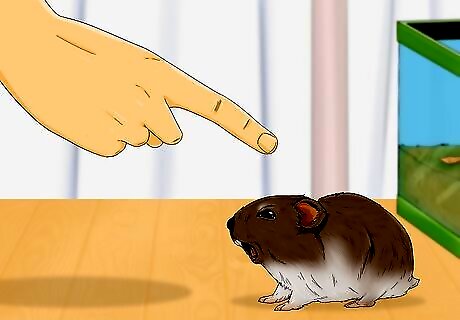
Stick to verbal cues and never use physical force. Since your gerbil may occasionally nip you when they don’t want to be held, just give them a firm “no” to let it know that’s not acceptable behavior. You’ll train it to be more tame and gentle—plus, you’ll make sure that your gerbil doesn’t fear you or other people because you’re so patient and communicative with them.
Cheer on your gerbil when it behaves well.
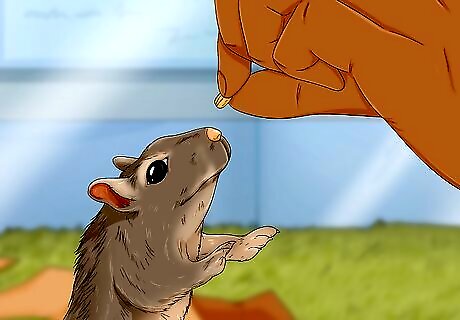
Use positive reinforcement to encourage your gerbil. Reward your gerbil with food or praise so it continues any positive behaviors you’re trying to prioritize. Understand that while your gerbil may make occasional mistakes, you must avoid physical discipline or yelling at them. When you’re gentle and caring, your gerbil will pick up excellent habits over time. Positive reinforcement trains your gerbil by rewarding the actions you want it to repeat, such as jumping into your hands or playing a game with you. When you play with gerbils, come up with entertaining little games that get them used to humans. Even something as simple as running on your lap can be fun and instructive for a gerbil! Reward your gerbil for good behavior or clever actions with treats like seeds or fruit.



















Comments
0 comment